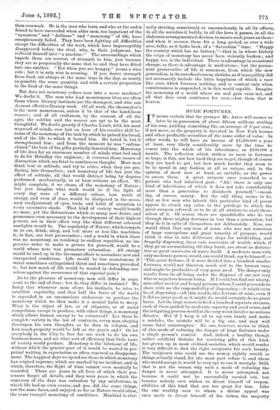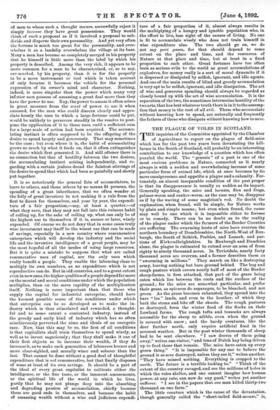HUGE FORTUNES.
IT seems certain that the younger Mr. Astor will sooner or later be in possession of about fifteen millions sterling of his own, yielding something like an average of 8 per cent., if not more, as the property is invested in New York houses and other profitable securities of the same order of value. In other words, he will have an income of 11,200,000 a year at least, very likely considerably more by the time he comes into the whole of his inheritance, or 2100,000 a month. The reflection which strikes us most in fortunes so huge, is this, not how hard they are to get, though of course they are hard to get, but how much harder they seem to be to spend in any fashion at all as unique, and, in the opinion of most men at least, as enviable, as the power to amass them. A great surgeon once remarked to a patient who had inherited gout : " Ah ! there is only one kind of inheritance of which it does not take considerably more than a generation to disinherit yourself,"—mean- ing, of course, money. But the odd thing seems to be, that so few men who inherit this particular kind of power appear to attach any value to the privilege to which the great surgeon referred, or to be at all anxious to avail them- selves of it. Of course there are spendthrifts who do run through these mighty fortunes in leas than a generation, but they do it in spite of themselves, not deliberately. Now, one would think that any man of sense who was not conscious of large conceptions and great tenacity of purpose, would think it wise to take deliberate steps for subdividing, and frugally dispersing, these vast reservoirs of wealth, which, if they go on accumulating till they burst, are about as destruc- tive as great reservoirs of water itself. A moderate man with only moderate powers, would, one would think, say to himself This great fortune, if it were divided into a hundred smaller fortunes, would not threaten much evil to the human race, and might be productive of very great good. The danger only results from its all being under the disposal of one not very wise or sagacious human being. If I could but find out ninety- nine other modest and frugal persons whom I could persuade to share with me the responsibility of dispensing,—it might even be, of dispersing,—all this wealth, this fortune of mine, even if it did no great good, as it might do, would certainly do no great harm. Let the huge reservoir feed a hundred separate streams, each of them guided by moderate capacity and good sense, and the irrigating process would at the very worst involve no serious disaster. But if I keep it all in my own hands and make a mistake, the mistake will be a big one, and may well cause fatal catastrophes.' No one, however, seems to think of this mode of reducing the danger of huge fortunes under a single person's control. And, indeed, a healthy though rather artificial distaste for receiving gifts of this kind, has grown up in most civilised societies, which would render it very difficult to find the right recipients for such bounty. The recipients who could use the money rightly would, as things actually stand, for the most part refuse it, and those who would accept it, would be very apt to use it wrongly. Still, that is not the reason why such a mode of reducing the danger is never attempted. It is never attempted, not because it could not be successfully carried out, but because nobody ever wishes to divest himself of respon- sibilities of this kind that are too great for him. Like the one wealthy man to whom a divine appeal was once made to divest himself of his riches, the majority of men to whom such a thought occurs, sorrowfully reject it simply because they have great possessions. They would think of such a proposal as if it involved a proposal to sub- divide and disperse their own personality. And yet very often the fortune is much too great for the personality, and over- whelms it as a landslip overwhelms the village at its base. Many a man has become so completely merged in his property that he himself is little more than the label by which his property is described. Among the very rich, it appears to be more common for a man to be characterised, or, so to say, ear-marked, by his property, than it is for the property to be a mere instrument or tool which is taken account of only because it becomes the vehicle for the personal expression of its owner's mind and character. Nothing, indeed, is more singular than the power which many very inferior men possess of amassing a great deal more than they have the power to use. Nay, the power to amass it often arises in great measure from the want of power to use it when
amassed, for the man who could discern clearly and appre- ciate keenly the uses to which a large fortune could be put, would be unlikely to persevere steadily in the resolve to post- pone the application of it to those uses, until a sufficient sum for a large scale of action had been acquired. The accumu- lating instinct is often supposed to be the offspring of the
desire to spend largely and generously. That may sometimes be the case ; but even where it is, the habit of accumulating
grows so much by what it feeds on, that it often extinguishes the desire which first generated it. And still oftener there is no connection but that of hostility between the two desires, the accumulating instinct arising independently, and re- garding with a certain jealous dread the faintest stirrings of the desire to spend that which had been so painfully and slowly put together.
It is so notoriously the general fate of accumulators, to leave to others, and those others by no means fit persons, the spending of a great inheritance, that we often wonder at the folly of great investors in not making it a rule from the first to direct for themselves, and year by year, the expendi- ture of a fair proportion,—say, at least a quarter,—of what they save, that they may not fall into this ruinous habit of rolling up, for the sake of rolling up, what can only be of the highest use to themselves if it is, sooner or later, wisely expended. Of course we do not deny that in some cases truly wise investment may itself be the wisest use that can be made of savings, especially in a new country where remunerative enterprises which will develop the industry and the social life and the inventive intelligence of a great people, may be the most hopeful of all the modes of using large resources. But it is quite a mistake to suppose that what are called remunerative uses of capital, are the only uses which really benefit a people. They enable the labouring class to multiply its own numbers, as no expenditure which is not reproductive can do. But in old countries, and to a great extent even in new ones, the higher qualities of a people depend far more on the mental and moral conditions under which the population multiplies, than on the mere rapidity of the multiplication itself. Nothing is more important than that those who supply the capital for industrial enterprise, should have the keenest possible sense of the conditions under which that enterprise can be so developed as to make the in- dustry which is thus stimulated and rewarded, a thought- ful and to some extent a contented industry, instead of the greedy and surly kind of industry which has so often mischievously perverted the aims and ideals of an energetic race. Now, that this may be so, the first of all conditions is that capitalists shall train themselves to spend wisely, as well as to invest sagaciously; that they shall make it one of their first objects so to increase their wealth, if they do increase it, as to make each generation of labourers keener and more clear-sighted, and morally wiser -and soberer than the last. That cannot be done without a good deal of thoughtful expenditure that is not remunerative, but that finally disposes of some at least of its own savings. It should be a part of the ideal of every great capitalist to cultivate either the intelligence, or the fine taste, or the innocent amusements, or the spiritual life of the world in which he lives, partly that he may not plunge deep into the absorbing and degrading passion of accumulation, chiefly because these are good ends in themselves, and because the habit of amassing wealth without a wise and judicious expendi- ture of a fair proportion of it, almost always results in the multiplying of a hungry and ignoble population who, in the effort to live, lose sight of the causes of living. No one is fit to accumulate wisely who does not train himself in wise expenditure also. The two should go on, we do not say pari passu, for that should depend to some extent on the place and time, and the resources of Nature at that place and time, but at least in a fixed proportion to each other. Great fortunes have too often been as serious evils to the world as great accumulations of explosives, for money really is a sort of moral dynamite if it is dispersed or dissipated by selfish, ignorant, and idle agents. And one of the main results of blind and greedy accumulation is very apt to be selfish, ignorant, and idle dissipation. The art of wise and generous spending should always be regarded as closely bound up with the art of wise accumulation. It is the separation of the two, the sometimes internecine hostility of the two arts, that has lent whatever truth there is in it to the assump- tion that money is the root of all evil. Those who accumulate without knowing how to spend, are naturally and frequently the fathers of those who dissipate without knowing how to save.



































 Previous page
Previous page